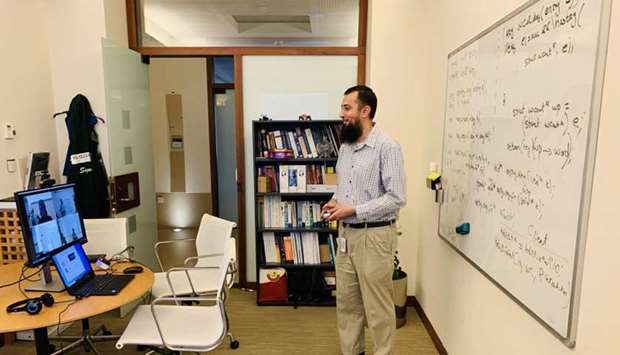The transition to online course delivery has spurred innovation in the way faculty members are approaching teaching at Carnegie Mellon University in Qatar (CMU-Q), a Qatar Foundation partner university.
Michael Trick, dean of CMU-Q, reflects on the long-term impact of the unplanned move to remote teaching, saying: “I really think that the faculty and the programmes are all going to be stronger having gone through this. Our faculty members have had to think carefully about what goes in their courses and how they all fit together.”

The Covid-19 pandemic was the catalyst for a swift move from classroom to online learning at the beginning of March. CMU-Q completed the full transition within two days of the official directive by the Qatar government suspending schools and universities.
Initially, the focus was simply to mimic in-person lectures and maintain the continuity of learning objectives. A taskforce of CMU-Q staff technology and educational experts guided the move of 125 courses to virtual delivery.
In the first few days, faculty members were still working from the CMU-Q building. With the closing of all but essential services in Education City, professors began working from their homes. Many students have returned to their home countries, and with students and professors in different time zones, faculty members began to explore ways to use the technology.
One approach has been to adopt a “flipped classroom” model of education. Using this approach, students are introduced to new material before class, and then class time is spent on learning activities, discussion and delving deeper into concepts. Online teaching, with ample use of technological tools, has spurred many CMU-Q professors to move to a flipped-classroom approach.
Khalid Warraich, chief information officer at CMU-Q and a member of the taskforce, described what is driving the innovation: “It's clear that human contact has become a precious commodity. Faculty members can provide materials digitally beforehand, and then focus on what is most valuable during their face-to-face time, like discussion, analysis and answering questions.”
For the students, the move to online learning has been quite smooth. First-year student Mohamed Ali Raza is completing the semester from his family home in Pakistan: “The experience is going great so far. I miss CMU, but apart from that, online classes are perfect. We can talk to professors and friends face to face, ask questions and get feedback.”
Information systems student Fatima Mustafawi, who will graduate this year with 87 of her classmates, remarked, “This is not how I wanted my CMU story to end, of course, but I think in some way it's been a blessing. This experience has made me more adaptable to my environment, and my priority is my work right now.”
Trick sees the innovation in teaching as an Education City-wide phenomenon: “The partner university deans realised pretty quickly that we couldn't do this all on our own. People are exchanging ideas, thoughts, resources, and in many ways, this has brought us together. I think this experience has made us all better educators.”

One of the students of CMU-Q attending an online session at home
The Covid-19 pandemic was the catalyst for a swift move from classroom to online learning at the beginning of March. CMU-Q completed the full transition within two days of the official directive by the Qatar government suspending schools and universities.
Initially, the focus was simply to mimic in-person lectures and maintain the continuity of learning objectives. A taskforce of CMU-Q staff technology and educational experts guided the move of 125 courses to virtual delivery.
In the first few days, faculty members were still working from the CMU-Q building. With the closing of all but essential services in Education City, professors began working from their homes. Many students have returned to their home countries, and with students and professors in different time zones, faculty members began to explore ways to use the technology.
One approach has been to adopt a “flipped classroom” model of education. Using this approach, students are introduced to new material before class, and then class time is spent on learning activities, discussion and delving deeper into concepts. Online teaching, with ample use of technological tools, has spurred many CMU-Q professors to move to a flipped-classroom approach.
Khalid Warraich, chief information officer at CMU-Q and a member of the taskforce, described what is driving the innovation: “It's clear that human contact has become a precious commodity. Faculty members can provide materials digitally beforehand, and then focus on what is most valuable during their face-to-face time, like discussion, analysis and answering questions.”
For the students, the move to online learning has been quite smooth. First-year student Mohamed Ali Raza is completing the semester from his family home in Pakistan: “The experience is going great so far. I miss CMU, but apart from that, online classes are perfect. We can talk to professors and friends face to face, ask questions and get feedback.”
Information systems student Fatima Mustafawi, who will graduate this year with 87 of her classmates, remarked, “This is not how I wanted my CMU story to end, of course, but I think in some way it's been a blessing. This experience has made me more adaptable to my environment, and my priority is my work right now.”
Trick sees the innovation in teaching as an Education City-wide phenomenon: “The partner university deans realised pretty quickly that we couldn't do this all on our own. People are exchanging ideas, thoughts, resources, and in many ways, this has brought us together. I think this experience has made us all better educators.”

